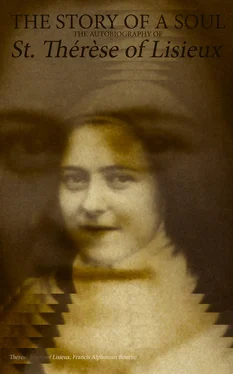Soon after my Mother's death, Papa made up his mind to leave Alençon and live at Lisieux, so that we might be near our uncle, my Mother's brother. He made this sacrifice in order that my young sisters should have the benefit of their aunt's guidance in their new life, and that she might act as a mother towards them. I did not feel any grief at leaving my native town: children love change and anything out of the common, and so I was pleased to come to Lisieux. I remember the journey quite well, and our arrival in the evening at my uncle's house, and I can still see my little cousins, Jeanne and Marie, waiting on the doorstep with my aunt. How touching was the affection all these dear ones showed us!
The next day they took us to our new home, Les Buissonets, [2]situated in a quiet part of the town. I was charmed with the house my Father had taken. The large upper window from which there was an extensive view, the flower garden in front, and the kitchen garden at the back—all these seemed delightfully new to my childish mind; and this happy home became the scene of many joys and of family gatherings which I can never forget. Elsewhere, as I said before, I felt an exile, I cried and fretted for my Mother; but here my little heart expanded, and I smiled on life once more.
When I woke there were my sisters ready to caress me, and I said my prayers kneeling between them. Then Pauline gave me my reading lesson, and I remember that "Heaven" was the first word I could read alone. When lessons were over I went upstairs, where Papa was generally to be found, and how pleased I was when I had good marks to show. Every afternoon I went out for a walk with him, and we paid a visit to the Blessed Sacrament in one or other of the Churches. It was in this way that I first saw the Chapel of the Carmel: "Look, little Queen," Papa said to me, "behind that big grating there are holy nuns who are always praying to Almighty God." Little did I think that nine years later I should be amongst them, that in this blessed Carmel I should receive so many graces.
On returning home I learnt my lessons, and then spent the rest of the day playing in the garden near Papa. I never cared for dolls, but one of my favourite amusements was making coloured mixtures with seeds and the bark of trees. If the colours were pretty, I would promptly offer them to Papa in a little cup and entice him to taste them; then my dearest Father would leave his work and smilingly pretend to drink. I was very fond of flowers, and amused myself by making little altars in holes which I happened to find in the middle of my garden wall. When finished I would run and call Papa, and he seemed delighted with them. I should never stop if I told you of the thousand and one incidents of this kind that I can remember. How shall I make you understand the love that my Father lavished on his little Queen!
Those were specially happy days for me when I went fishing with my dear "King," as I used to call him. Sometimes I tried my hand with a small rod of my own, but generally I preferred to sit on the grass some distance away. Then my reflections became really deep, and, without knowing what meditation meant, my soul was absorbed in prayer. Far-off sounds reached me, the murmuring of the wind, sometimes a few uncertain notes of music from a military band in the town a long way off; all this imparted a touch of melancholy to my thoughts. Earth seemed a place of exile, and I dreamed of Heaven.
The afternoon passed quickly away, and it was soon time to go home, but before packing up I would eat the provisions I had brought in a small basket. Somehow the slices of bread and jam, prepared by my sisters, looked different; they had seemed so tempting, and now they looked stale and uninviting. Even such a trifle as this made the earth seem sadder, and I realised that only in Heaven will there be unclouded joy.
Speaking of clouds, I remember how one day when we were out, the blue sky became overcast and a storm came on, accompanied by vivid lightning. I looked round on every side, so as to lose nothing of the grand sight. A thunderbolt fell in a field close by, and, far from feeling the least bit afraid, I was delighted—it seemed that God was so near. Papa was not so pleased, and put an end to my reverie, for already the tall grass and daisies, taller than I, were sparkling with rain-drops, and we had to cross several fields to reach the road. In spite of his fishing tackle, he carried me in his arms while I looked down in the beautiful jewelled drops, almost sorry that I could not be drenched by them.
I do not think I have told you that in our daily walks at Lisieux, as in Alençon, I often used to give alms to the beggars. One day we came upon a poor old man who dragged himself painfully along on crutches. I went up to give him a penny. He looked sadly at me for a long time, and then, shaking his head with a sorrowful smile, he refused my alms. I cannot tell you what I felt; I had wished to help and comfort him, and instead of that, I had, perhaps, hurt him and caused him pain. He must have guessed my thought, for I saw him turn round and smile at me when we were some way off.
Just then Papa bought me a cake. I wished very much to run after the old man and give it to him, for I thought: "Well, he did not want money, but I am sure he would like to have a cake." I do not know what held me back, and I felt so sad I could hardly keep from crying; then I remembered having heard that one obtains all the favours asked for on one's First Communion Day. This thought consoled me immediately, and though I was only six years old at the time, I said to myself: "I will pray for my poor old man on the day of my First Communion." Five years later I faithfully kept my resolution. I have always thought that my childish prayer for this suffering member of Christ has been blessed and rewarded.
As I grew older my love of God grew more and more. I often offered my heart to Him, using the words my Mother had taught me, and I tried very hard to please Him in all my actions, taking great care never to offend Him. And yet one day I committed a fault which I must tell you here—it gives me a good opportunity of humbling myself, though I believe I have grieved over it with perfect contrition.
It was the month of May, 1878. My sisters decided that I was too small to go to the May devotions every evening, so I stayed at home with the nurse and said my prayers with her before the little altar which I had arranged according to my own taste. Everything was small—candlesticks, vases, and the rest; two wax vestas were quite sufficient to light it up properly. Sometimes Victoire, the maid, gave me some little bits of real candle, but not often.
One evening, when we went to our prayers, I said to her: "Will you begin the Memorare? I am going to light the candles." She tried to begin, and then looked at me and burst out laughing. Seeing my precious vestas burning quickly away, I begged her once more to say the Memorare. Again there was silence, broken only by bursts of laughter. All my natural good temper deserted me. I got up feeling dreadfully angry, and, stamping my foot furiously, I cried out: "Victoire, you naughty girl!" She stopped laughing at once, and looked at me in utter astonishment, then showed me—too late—the surprise she had in store hidden under her apron—two pieces of candle. My tears of anger were soon changed into tears of sorrow; I was very much ashamed and grieved, and made a firm resolution never to act in such a way again.
Shortly after this I made my first confession. [3]It is a very sweet memory. Pauline had warned me: "Thérèse, darling, it is not to a man but to God Himself that you are going to tell your sins." I was so persuaded of this that I asked her quite seriously if I should not tell Father Ducellier that I loved him "with my whole heart," as it was really God I was going to speak to in his person.
Читать дальше












